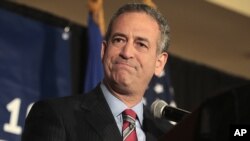PARIS —
U.S. Special Envoy to the Democratic Republic of Congo (DRC) Russ Feingold has hailed as potentially historic a peace deal signed between the Congolese government and the M23 rebel movement. But Feingold, who attended the event in Nairobi, says much more needs to be done to turn around a country and region plagued by years of conflict.
Special Envoy Russ Feingold described the peace deal signed just hours before as a real chance to turn around troubled and resource-rich Democratic Republic of Congo.
"While this is only a first step, it is a very big step, maybe an historic step," said Feingold. "Stopping the M23 rebellion, which was causing enormous harm to the people of eastern Congo, is a major stop in the right direction that I think most people wouldn't have thought possible even a year ago."
Feingold spoke by telephone from the Paris airport, en route to Washington from Nairobi, where Congolese government and the M23 signed a deal Thursday to end one of DRC's most serious rebellions in a decade. Congolese officials have refrained from calling the deal a peace agreement, but Feingold said that, in effect, is what it is.
"And we want to work with countries in the region not only to get rid of other armed groups, which I think that we can do, working with the United Nations force, but also to provide opportunities for economic development and prosperity," said Feingold. "So this is a really good step in the right direction."
The agreement marks a major turnaround from just over a year ago, when the M23 rebels occupied large chunks of eastern Congo, and briefly captured North Kivu's provincial capital of Goma. But this is hardly the first peace deal in a region where an array of armed groups still operate.
Feingold says this one is different. Countries in the region co-sponsored the talks that were carried out publicly and with the involvement of international observers.
"It also is different in that amnesty is not offered to rebels who are involved in war crimes or crimes against humanity," said Feingold. "That was a mistake that was made in the past - and it will not be repeated under this agreement."
Feingold outlined a series of steps needed in the coming months, including reforming the Congolese military and strengthening democracy and the country's justice system. He says relatively modest investments from the international community can help bring about change and new opportunities for one of the world's most problematic regions.
Special Envoy Russ Feingold described the peace deal signed just hours before as a real chance to turn around troubled and resource-rich Democratic Republic of Congo.
"While this is only a first step, it is a very big step, maybe an historic step," said Feingold. "Stopping the M23 rebellion, which was causing enormous harm to the people of eastern Congo, is a major stop in the right direction that I think most people wouldn't have thought possible even a year ago."
Feingold spoke by telephone from the Paris airport, en route to Washington from Nairobi, where Congolese government and the M23 signed a deal Thursday to end one of DRC's most serious rebellions in a decade. Congolese officials have refrained from calling the deal a peace agreement, but Feingold said that, in effect, is what it is.
"And we want to work with countries in the region not only to get rid of other armed groups, which I think that we can do, working with the United Nations force, but also to provide opportunities for economic development and prosperity," said Feingold. "So this is a really good step in the right direction."
The agreement marks a major turnaround from just over a year ago, when the M23 rebels occupied large chunks of eastern Congo, and briefly captured North Kivu's provincial capital of Goma. But this is hardly the first peace deal in a region where an array of armed groups still operate.
Feingold says this one is different. Countries in the region co-sponsored the talks that were carried out publicly and with the involvement of international observers.
"It also is different in that amnesty is not offered to rebels who are involved in war crimes or crimes against humanity," said Feingold. "That was a mistake that was made in the past - and it will not be repeated under this agreement."
Feingold outlined a series of steps needed in the coming months, including reforming the Congolese military and strengthening democracy and the country's justice system. He says relatively modest investments from the international community can help bring about change and new opportunities for one of the world's most problematic regions.




